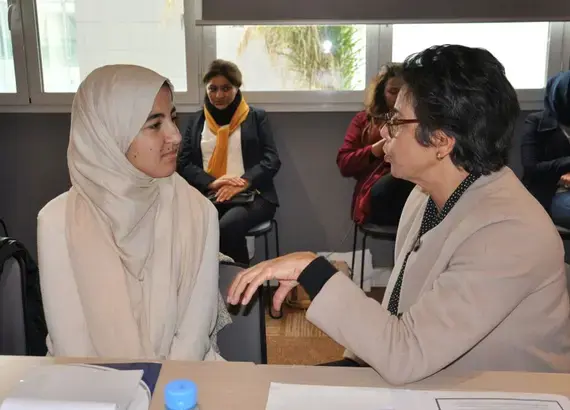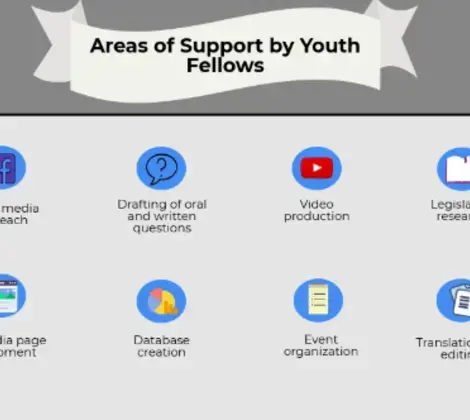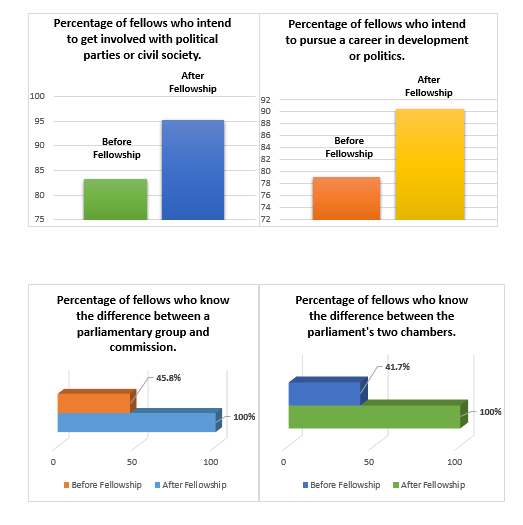
NDI’s parliamentary fellows gained exposure to a wide array of parliamentary processes and activities throughout their terms working with Moroccan members of parliament.
Success Story
Morocco’s Young Parliamentary Fellows Work to Advance Women’s Political Participation
It’s 8:30 AM and Fatiha* is walking into the Moroccan Parliament. In a few minutes, she’s scheduled to sit down with her member of parliament (MP) for their weekly one-on-one meeting. Fatiha plans to propose a new strategy to increase the MP’s social media visibility. By 9 AM, Fatiha is at her desk putting the final touches on a Facebook update to publicize the MP’s visit to a local market, which falls in line with her proposed new social media strategy. “I have enormously appreciated the exchanges with [my MP]. They have been truly rich in discussion, learning and information,” said Fatiha.
Half an hour later, Fatiha is on her feet again, this time to join a parliamentary commission meeting where she’ll take notes that will be used to develop a summary report on the discussion. As soon as the meeting concludes, Fatiha heads back to her desk, this time to work on a project to review and propose changes to a draft bill to modify the code of commerce.
This sample itinerary shows that a fellowship at the Moroccan Parliament isn’t for the faint of heart. Beyond the dizzying array of duties, the nature of working with elected officials creates an additional layer of responsibility and obligation to citizens and constituents, imbuing assignments with greater significance and impact. But for participants in NDI’s parliamentary fellowship initiative, the benefits far outweigh the pressure. Through their work in the parliament, these young Moroccans have gained insight and understanding into the internal workings of Moroccan politics and have built connections and networks within the political system, preparing them to substantively participate in civic and political processes in Morocco and to serve as models for their peers.
Although youth compose roughly 30 percent of the Moroccan population, young Moroccans are largely disengaged from the country’s formal political institutions. Only 20 percent of Moroccans under 35 years old voted in the much-heralded 2011 parliamentary elections and even fewer are estimated to have voted in the subsequent 2016 elections. Under one percent of Moroccan youth are active in political parties and those who lament that they face significant barriers to meaningful participation.
While young Moroccans are generally absent from official political bodies, they continue to be active in political advocacy. Thousands of Moroccan youth were involved in the roughly year-long protest movement in Morocco’s northern Rif region in 2016 and 2017. Youth composed the majority of demonstrators in the small northeastern town of Jerada, where uprisings broke out after the death of two young miners. These recurring outbursts of youth mobilization indicate that young Moroccans have the interest and capacity to demand that their grievances be addressed, but lack the networks, skills and knowledge to use formal political channels to seek responses to their needs.
Although the Moroccan government has committed to including and empowering young citizens, as evidenced by the establishment of regional youth councils and a youth parliamentary list, these institutions remain opaque or inaccessible to the majority of young Moroccans. Young women face particularly tall barriers to their full political participation. While women now constitute just over 20 percent of Moroccan parliamentarians, the majority are seated on the national gender quota list on which they are only permitted to serve a single term. Parties must nominate them to a constituency-based list for them to continue to serve.
I've been...mostly helping with legislative research and getting to know the parliamentary structure. I'm learning a lot and I hope to run for office one day.
- Reda Akdim, 2018 parliamentary fellow.
NDI worked to address these challenges by launching an initiative to engage 26 young Moroccans from around the country to take on five-month fellowships with women MPs. The program helped elected officials carry out their duties while simultaneously exposing the young fellows to the inner workings of Morocco’s political system. Throughout the program, which took place from November 2017 to May 2018, NDI worked closely with the Parliament of Morocco to ensure that the fellowship initiative had the full support of parliamentary officials. This partnership was reflected in the signing a memorandum of understanding that formally outlined how NDI and parliament would coordinate on the fellowships.
The Institute facilitated training opportunities for fellows during their tenures. Fellows participated in a Wikithon, during which they created Wikipedia pages for Morocco’s women and youth MPs, with the aim of raising the online profiles of elected officials from these underrepresented groups. The Wikithon was held with support from the Embassy of Sweden, UN Women in Morocco and the Democratic Association of Moroccan Women (ADFM). In May, NDI organized another training for fellows which centered on creating Facebook pages for the MPs.

Areas of Support by Youth Fellows

Ibtissame Azzaoui, an MP from the Authenticity and Modernity Party, expressed her appreciation for the program. “I cannot emphasize enough how grateful I am to have [my fellow] working with me,” she said. “If she weren’t assisting me, I would have [such a heavy] workload that I wouldn't be half as productive as I am today thanks to her help.”
The activities of the fellows – particularly in areas such as drafting questions and carrying out legislative research – have positively impacted the Moroccan political system, helping MPs to make more informed, well-researched decisions. “This initiative really shows that NDI understands the needs of women MPs in Morocco,” said Fatima Zahra Nazih, an MP from the Popular Movement (MP) party.
Fellows gained crucial in-person insight into the Moroccan political system, giving them a nuanced understanding of how the Moroccan political process operates, strengthening their knowledge of political processes and structures. “This opportunity helped me to [learn] more about legislative efforts,” said Oumaima Ait Hammou, a parliamentary fellow. “Through this experience, I learned how bills are drafted, amended, and passed.”
The program also had an impact on the fellows’ professional trajectories; at the end of their terms, 95 percent of fellows stated that they planned to get involved with political parties or civil society and 91 percent expressed their intent to pursue a career in development or politics.
*Name has been changed to reflect that narrative is a composite of anecdotes from several NDI parliamentary fellows.
This program was implemented with support from the National Endowment for Democracy (NED) and the Eduardo Frei Foundation (EFF).



